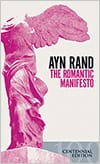Hi, Guest!
The four essential attributes of a novel are: Theme — Plot — Characterization — Style.
These are attributes, not separable parts. They can be isolated conceptually for purposes of study, but one must always remember that they are interrelated and that a novel is their sum. (If it is a good novel, it is an indivisible sum.)

A theme is the summation of a novel’s abstract meaning. For instance, the theme of Atlas Shrugged is: “The role of the mind in man’s existence.” The theme of Victor Hugo’s Les Miserables is: “The injustice of society toward its lower classes.” The theme of Gone With the Wind is: “The impact of the Civil War on Southern society.”
A theme may be specifically philosophical or it may be a narrower generalization. It may present a certain moral-philosophical position or a purely historical view, such as the portrayal of a certain society in a certain era. There are no rules or restrictions on the choice of a theme, provided it is communicable in the form of a novel. But if a novel has no discernible theme — if its events add up to nothing — it is a bad novel; its flaw is lack of integration.
Louis H. Sullivan’s famous principle of architecture, “Form follows function,” can be translated into: “Form follows purpose.” The theme of a novel defines its purpose. The theme sets the writer’s standard of selection, directing the innumerable choices he has to make and serving as the integrator of the novel.
Since a novel is a re-creation of reality, its theme has to be dramatized, i.e., presented in terms of action. Life is a process of action. The entire content of man’s consciousness — thought, knowledge, ideas, values — has only one ultimate form of expression: in his actions; and only one ultimate purpose: to guide his actions. Since the theme of a novel is an idea about or pertaining to human existence, it is in terms of its effects on or expression in human actions that that idea has to be presented.

A cardinal principle of good fiction [is]: the theme and the plot of a novel must be integrated — as thoroughly integrated as mind and body or thought and action in a rational view of man.
The link between the theme and the events of a novel is an element which I call the plot-theme. It is the first step of the translation of an abstract theme into a story, without which the construction of a plot would be impossible. A “plot-theme” is the central conflict or “situation” of a story — a conflict in terms of action, corresponding to the theme and complex enough to create a purposeful progression of events.
The theme of a novel is the core of its abstract meaning — the plot-theme is the core of its events.

The theme of a novel can be conveyed only through the events of the plot, the events of the plot depend on the characterization of the men who enact them — and the characterization cannot be achieved except through the events of the plot, and the plot cannot be constructed without a theme.
This is the kind of integration required by the nature of a novel. And this is why a good novel is an indivisible sum: every scene, sequence and passage of a good novel has to involve, contribute to and advance all three of its major attributes: theme, plot, characterization.
Those who may be interested in the chronological development of my thinking . . . may observe the progression from a political theme in We the Living to a metaphysical theme in Atlas Shrugged.
[We the Living] was published in 1936 and reissued in 1959. Its theme is: the individual against the state; the supreme value of a human life and the evil of the totalitarian state that claims the right to sacrifice it.
[Anthem] was first published in England in 1938. Its theme is: the meaning of man’s ego.
[The Fountainhead] was published in 1943. Its theme is: individualism versus collectivism, not in politics, but in man’s soul; the psychological motivations and the basic premises that produce the character of an individualist or a collectivist.
[Atlas Shrugged] was published in 1957. Its theme is: the role of the mind in man’s existence — and, as corollary, the demonstration of a new moral philosophy: the morality of rational self-interest.